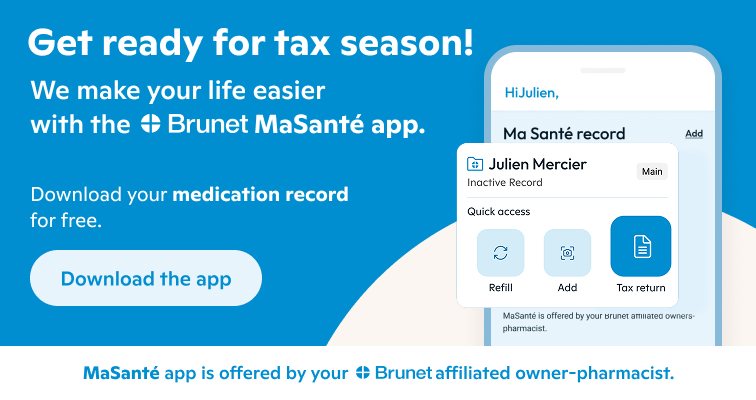Despite having adopted healthy eating habits and enjoying regular exercise, your cholesterol levels are still too high? The next step you may have to consider is taking medication. Cross that bridge without fear by learning more about these types of drugs.

The importance of medication
You suffer from hypercholesterolemia (high cholesterol) and despite your efforts to change your diet and increase your level of physical activity, the doctor has announced that you must take medication. Rest assured, you are not alone! Indeed, a large number of people are unable to lower their cholesterol levels even by making positive changes to their daily habits. No need to worry; all roads lead to Rome. The main thing is finding effective ways to reduce your cholesterol.
It is vital to remember that cholesterol is the main risk factor for heart disease and stroke. By treating your condition in the best way possible, you will reduce your chances of suffering from such diseases. And better understanding your medication’s purpose will undoubtedly make this pill easier to swallow.
Statins: the cornerstone of treatment
The most-often prescribed type of medication to lower cholesterol levels come from a class of drugs called “statins.” They block the liver’s production of cholesterol and are very effective in reducing its level in blood. As a matter of fact, they can reduce your “bad” cholesterol, also known as LDL cholesterol, by almost 55%. It is best to take this type of medication once a day, at the same time (preferably dinner or bedtime).
These medications are usually well tolerated. They can, however, cause headaches, digestive issues and muscle pain or weakness. Some factors can also predispose you to these unpleasant muscular side effects:
- advanced age;
- small build;
- poor liver function;
- infection;
- interaction with another medication;
- abuse of alcohol.
If you experience these side effects in your muscles, you must tell your pharmacist right away. He or she may wish to change your statin or choose a different class of medication. Furthermore, statins may cause your liver’s enzymes to increase. Your doctor will most likely schedule blood tests to gauge them shortly after you start your treatment, allowing him or her to detect this potential side effect.
In case of intolerance
If you start experiencing side effects linked to your statin prescription, you may be tempted to stop treatment altogether. But don’t do anything before speaking with your pharmacist since many of these side effects can be alleviated through a variety of measures. As well, before deciding that cholesterol-fighting medications are not appropriate for you, consider the possibility of taking medications from other drug classes, such as:
- cholesterol absorption inhibitors;
- resins;
- fibrates;
- niacin.
No matter which type of treatment you choose, your doctor will have to check your cholesterol levels every year.
Your pharmacist is the best-suited health professional to answer your questions about medications and all their facets. Don’t make any decisions about medication without consulting him or her first. Taking medication should always be decided after an in-depth analysis of the treatment’s potential benefits, as well as its risks and drawbacks. Because it is a big step to take, ask your pharmacist to help you make such an analysis and take a well-informed decision.
Sticking with your treatment is the best option
Taking cholesterol-reducing medication is not an excuse to forego adopting and maintaining a healthy lifestyle. On the contrary, making the right food choices and exercising will increase the efficiency of your medication. No drug can cure hypercholesterolemia; if you cease taking medication, cholesterol returns to its original level, so it is of utmost importance to take your medication every day to maintain its beneficial effects. If your cholesterol levels reach the numbers that were targeted at the beginning of your treatment, you might be tempted to stop it. Don’t! Your new results simply mean that the treatment is working and that it must be maintained.
Sometimes, the motivation to take medication can be high at the beginning, but after a while, it loses steam. Here are some reasons that might make you feel less inclined to continue treatment or even decide to stop it altogether:
- you are experiencing negative side effects;
- you don’t suffer from any symptom related to high cholesterol;
- you are not feeling the benefits of treatment;
- you don’t truly believe that you are suffering from a serious condition;
- you find the treatment too expensive.
If you are having trouble taking your medication every day, your pharmacist may have a few tips to help. He or she may, among other things, put the above-listed factors into perspective and support you in your resolve to take care of your health.
In short, even if you can’t see or feel it, cholesterol flows through your blood vessels and causes significant damage. If your doctor has prescribed medication, it is because she or he believes you truly need it. Trust your doctor. And if, after a while, you start losing the motivation to take your medication, think of the consequences that would impact your life if you were to have a stroke or suffer from heart disease, such as a heart attack. Without a doubt, these would be much more limiting than the situation you are facing now. Something to think about!
